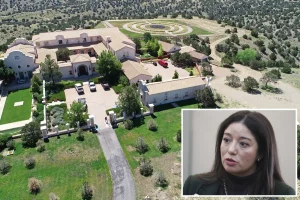America’s Billionaire Boom: A Record-Breaking Year of Wealth
In a year marked by staggering wealth accumulation, America’s richest individuals have shattered previous records across the board. The 2025 Forbes 400 list reveals that the wealthiest Americans now collectively control an astonishing $6.6 trillion—an increase of $1.2 trillion from just one year ago. The minimum entry requirement has climbed to an unprecedented $3.8 billion, half a billion dollars higher than last year’s threshold. This dramatic wealth expansion highlights the growing concentration of resources among America’s elite, creating an ever-widening gap between the ultra-wealthy and the rest of society. For perspective, the combined wealth of these 400 individuals exceeds the GDP of all but a handful of nations, representing a level of private fortune accumulation unprecedented in human history.
At the summit of this wealth mountain stands Elon Musk, who has achieved what no person before him has managed: breaking the $400 billion mark. Worth an estimated $428 billion—a figure that’s difficult to truly comprehend—Musk’s wealth increased by $184 billion in just twelve months, primarily due to Tesla’s 56% stock price increase and rising valuations for his private companies SpaceX and xAI. To put Musk’s dominance in perspective, the gap between him and second-place Larry Ellison ($276 billion) exceeds Warren Buffett’s entire fortune. Ellison himself enjoyed an extraordinary year with a $101 billion wealth increase thanks to Oracle’s strong performance, while Mark Zuckerberg secured third place with $253 billion following Meta’s 42% stock rise. These figures reflect not just business success but the almost unfathomable scale at which wealth accumulates at these heights—where fortunes can grow by amounts that would rank among the world’s largest companies.
The concentration of wealth among the super-rich has reached new extremes, with the top 20 wealthiest Americans holding $3 trillion—nearly half of all American billionaire wealth. Fifteen of these individuals now belong to the exclusive “$100 billion club,” including newcomers Alice, Rob, and Jim Walton, the surviving children of Walmart founder Sam Walton. Alice Walton, worth $106 billion, has made history as the first woman centibillionaire on the list and retains her position as America’s richest woman. Despite this milestone, women’s representation on the Forbes 400 has actually declined from 17% to 16%, with 62 women making the cut—down from 67 last year. The wealthiest self-made woman remains Diane Hendricks at $22.3 billion, whose building materials empire continues to thrive in America’s construction industry. This persistent gender imbalance reflects ongoing disparities in access to capital, leadership opportunities, and generational wealth transfers.
Despite the record-high minimum wealth requirement, fourteen Americans made their debut on this year’s list—all self-made entrepreneurs rather than heirs to existing fortunes. The wealthiest newcomer, Edwin Chen, has amassed an $18 billion fortune through his AI data-labeling company Surge AI, and at just 37, represents a younger generation of tech wealth. Other notable new entrants include Adam Foroughi ($17.4 billion) of AppLovin, Robert Pender and Michael Sabel (each worth $12.8 billion) of Venture Global, along with more recognizable names like Robinhood’s Vlad Tenev and Dutch Bros Coffee’s Travis Boersma. Meanwhile, twenty-two former listees managed to return to the ranks after previous absences, including Charles Ergen of Dish Network, David Baszucki of Roblox, and the Winklevoss twins of Facebook and cryptocurrency fame. These success stories reflect the dynamic nature of American capitalism and the continued opportunities for wealth creation, particularly in technology and energy sectors.
As the wealth threshold rises, the list of billionaires who aren’t quite wealthy enough to make the Forbes 400 continues to grow. Twenty-six people dropped off this year’s list despite maintaining their fortunes, simply because others surpassed them. They join a record 500 American billionaires who, despite having ten-figure net worths, didn’t meet the $3.8 billion cutoff. This “billionaire but not rich enough” group includes household names like Oprah Winfrey ($3.1 billion), Scale AI founder Alexandr Wang ($3.2 billion), U.S. Commerce Secretary Howard Lutnick ($3.4 billion), South Park creators Trey Parker and Matt Stone ($1.2 billion each), basketball legend LeBron James ($1.2 billion), and global pop star Taylor Swift ($1.6 billion). Their exclusion from the Forbes 400 underscores just how rarefied the air has become at the top of America’s wealth hierarchy, where even established billionaires can find themselves relegated to second-tier status.
Despite their unprecedented accumulation of wealth, America’s richest individuals aren’t necessarily sharing their good fortune proportionally. Forbes’ investigation into charitable giving reveals that while the 400 billionaires have collectively donated approximately $319 billion throughout their lifetimes, three-quarters have given away less than 5% of their wealth. Even more striking, 40% have donated less than 1% of their fortunes, and only eleven people—a mere 2.75% of the list—have given away at least 20% of their wealth. This disparity between wealth accumulation and philanthropic giving raises important questions about social responsibility, tax policy, and the concentration of resources in an era of growing inequality. While some billionaires have signed the Giving Pledge, committing to donate the majority of their wealth, the overall pattern suggests that most of America’s richest individuals are holding onto their fortunes rather than redistributing them through charitable channels.






